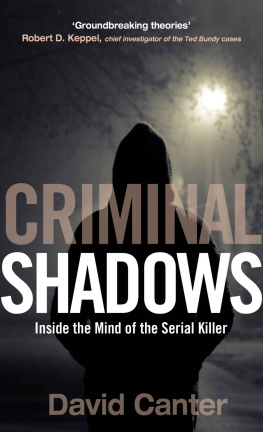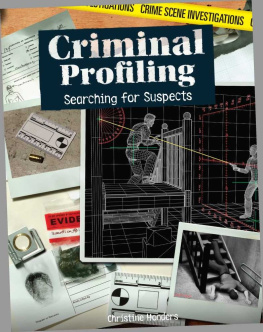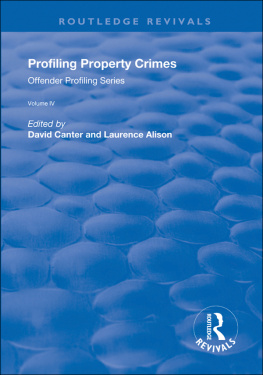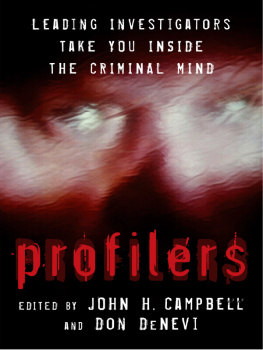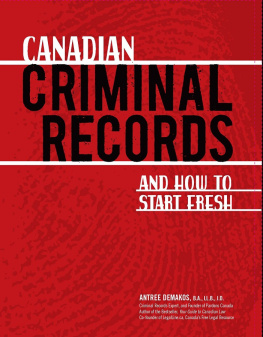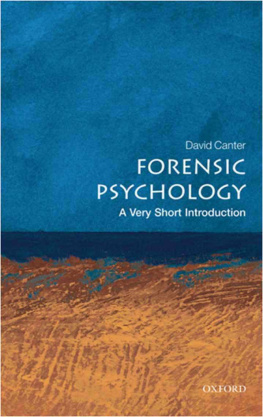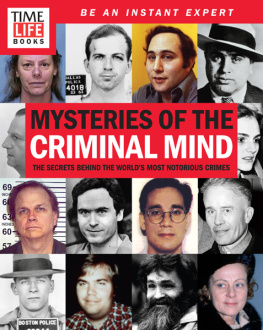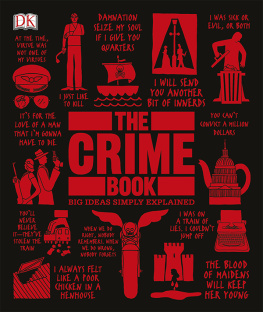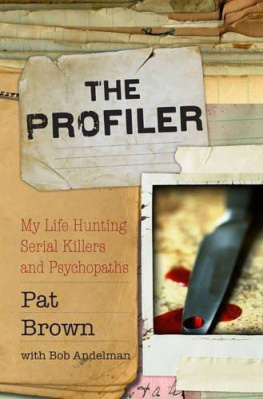Criminal Shadows: Inside the Mind of the Serial Killer
David Canter
Copyright David Canter 1994
The right of David Canter to be identified as the author of this work has been asserted by him in accordance with the Copyright, Designs and Patents Act, 1988.
First published in the United Kingdom in 1994 by HarperCollins.
This edition published in 2015 by Endeavour Press Ltd.
Table of Contents
Foreword
In the bloody world of crime fighting, scientists often are unwelcome problem-solvers. Among case-hardened detectives, instinct, hunches and experience frequently overrule scientific theory. But once in a while, along comes someone whose theories are so profound, and the research so convincing we can no longer dare to look the other way.
Dr. David Canter is such a man.
In the late 1980s, when he first began using psychological profiles to help catch rapists and murderers, it was a novel idea. Only senior police officers and a few psychologists had heard of deriving clues about an assailants personality and lifestyle from a careful, behavioral examination of the crime and the scene. Few formal studies had been done until Canter painstakingly picked through crime-scene information, and scrutinized details, not as a criminologist, but from his perspective as a psychologist.
In less than a decade Canters well-documented theories, along with some not-so-authentic copycat versions, are generally accepted today by a growing number of police forces throughout the world theories as profound as reading crime patterns to determine where a criminal actually lives.
Thanks to Canters laborious studies, investigators now have a set of practical behavioral principles to help precisely predict an unknown criminals domestic circumstances, employment and character, and to catch culprits who might otherwise allude police for years.
Canters original work now forms the foundation for a number of systematic studies on criminal profiling underway by psychiatrists and psychologists, worldwide. He has pushed investigators understanding about violent criminal behavior beyond personal insights and intuition to a new level of scientific comprehension. He rejects traditional reasons for criminal acts, such as genetic make-up, birth trauma, lack of self-control, or social pressures. Instead he examines what drives a person beyond the bounds of socially acceptable aggression into the realms of criminal violence.
In this book, Canter takes us on a fascinating journey through his groundbreaking theories, reminding us that criminals live as normal people hidden in our midst, not necessarily as monsters we can readily see. He dissects subtle variations in the underlying themes that drive vicious offenders, and shows us how to use these stories as clues to a criminals personality and identity.
Canters double-sided mission is to help solve rapes and murders, and to understand both the root causes of violence and the journeys that lead criminals to the darkest places of human existence. Not only does Canters work broaden our knowledge of criminal behavior, it provides the framework for an important new field, Investigative Psychology, in which criminology and psychology can, at last, harmonize as a single force against violence.
Criminal Shadows is essential reading for anyone involved in law enforcement. In this quest we view a criminals acts of violence through the shadows he casts, and by what Canter calls the criminals own inner narratives.
By learning to read these criminal shadows, we can become better investigators, and hopefully help make the world a little safer for us all.
Robert D. Keppel, former Chief Criminal Investigator with the Washington State Attorney Generals Office, President of the Institute for Forensics in Seattle, Washington. Participated in more than 2000 murder investigations, and was chief investigator in the Ted Bundy murder cases in the Pacific Northwest.
Acknowledgements
Rupert Heritage is present on most of the pages of this book, which would never have existed without his full cooperation. I hope it is a suitable tribute to his wit and friendship. More recently two other police officers, Rick Holden and Stuart Kirby, have taken up studies with me. Many of the things they have taught me have found their way into the present volume. I am very grateful to them for their insights and goodwill.
A number of senior police officers have supported and helped the work covered in this book and contributed to its subsequent development. Out of many, I owe very special gratitude to John Grieve, Vince McFadden and Thelma Wagstaff. They all openly welcomed me into the world of criminal investigations. I also greatly appreciate the support which John Hurst and John Stevens have continued to give me and my colleagues.
With some temerity I approached police officers who had been involved in the various cases that I describe in the book, asking them to look over the chapters I had written. Without exception they responded quickly and with courtesy. giving me detailed comments on the veracity of what I had written as they saw it. So, although they cannot be held responsible for my account of the investigations. I am grateful for their careful assistance. My contacts with the police have, however, taught me a certain discretion. I therefore think that it is probably best not to mention their names. However, there is no secret that the following forces have been of tremendous help both while I was writing this book and also in helping my colleagues me in the study of criminal behavior: Greater Manchester, Metropolitan, South Wales, Surrey and West Midlands. Other police forces and police officers also continue to contribute to the Investigative Psychology research and teaching at the University of Surrey. I hope they will see this book as at least a small, constructive repayment of the debt I owe them.
My secretary at the University of Surrey has specifically asked not to be named in this book. I am happy to acknowledge her help, which is never anonymous.
Over a number of years Rupert and I have been privileged to keep in contact with the Behavioral Science Unit at Quantico. Robert (Roy) Hazelwood, Bob Ressler, Jannet Warren have been especially kind, and generous, John Douglas, Roland Reboussin and Ann Burgess also shared with us their thoughts, experiences and reports. The friendly guidance and warm encouragement them and their colleagues have been a continual source of inspiration. Their pioneering work and productive insights are the foundation of this book.
At the University of Surrey I have been particularly fortunate in the backing I have received from my colleagues. The Vice Chancellor, Anthony Kelly, has gone out of his way to facilitate my research and the writing of this book. Indeed it was from him that I appreciated the significance of Platos shadows to the theme of my book. He gave me the greatest gift of all when he allowed me to take a sabbatical in which to write. Glynis Breakwell readily shouldered my administrative responsibilities to become Head of the Psychology Department, in which he has continued to assist my writing and thinking, ling many valuable comments on the manuscript unfurled. The sub-librarian for psychology, Mark Ashworth, has given me assistance far beyond the call of duty.
A number of undergraduates at the University of Surrey have worked with me during the writing of this book, giving help and advice in many ways. They include Adam Gregory (who helped prepare the illustrations for this book), Helen Hughes, Paul Larkin, Ellen Tzang and Graeme Vaughan. Many postgraduates have also contributed to my thinking, and added to the excitement of working in this area. They include Anne Davies, Jennifer Kilcoyne, Chris Missen and Jenny Ward. David Jordan deserves a special mention for making available to me his invaluable undergraduate dissertation on Michael Ryan.
Next page
